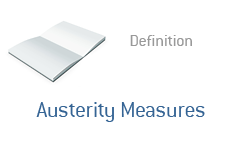Definition of Austerity Measures
What are "austerity measures"? What does the term "austerity measures" mean?
You have likely heard the term "austerity measures" used in the media quite frequently as of late, especially in regards to Greece.
For help in defining this term, let's first look up the definition of "austere".
 "Austere" means "strict or severe in discipline".
"Austere" means "strict or severe in discipline". "Austerity measures" are strict measures that are undertaken by a government to help bring expenditures more in line with revenues.
"Austerity measures" can be voluntarily implemented (for example, in order to bring deficits down) or involuntarily implemented (for example, if a country defaults on its debt and is given loans by the IMF).
"Austerity measures" usually include a combination of spending cuts and tax/fee increases.
The most common example of "austerity measures" occurs when a sovereign government's bond rating is downgraded. This makes borrowing more expensive, and usually forces the government to impose these new measures.
Many European countries have either imposed "austerity measures" or are in the process of introducing them.
--
Davemanuel.com Articles That Mention Austerity Measures:
Greek Banks To Re-Open on Monday
61% Vote "No" in Greek Referendum
Eurozone Unemployment Hits All-Time High
France, Greece and Italy Vote "No" To Austerity Measures
Double-Dip Recession Hits The United Kingdom
